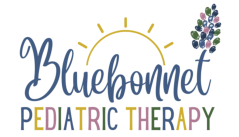MYOFUNCTIONAL THERAPY
BLUEBONNET PEDIATRIC MYOFUNCTIONAL THERAPY
OROFACIAL MYOFUNCTIONAL DISORDERS
Orofacial myofunctional disorders (OMDs) are abnormal movement patterns of the face and mouth. Speech-language pathologists trained in myofunctional therapy can help.
Children, teenagers, and adults may suffer from OMDs. OMDS may interfere with normal growth and development of the muscles and bones of the face and mouth. OMDs may also interfere with how the muscles of the face and mouth are used for eating, talking, and breathing. People who have an OMD may also have problems with talking, swallowing, and breathing through their nose.
Signs and Symptoms
Some signs of an OMD may include the following:
- Someone who always breathes through the mouth or has difficulty breathing through the nose.
- Limited tongue movement.
- Eating may be messy or difficult. Keep in mind that it is normal for babies to stick their tongue out and push food out of their mouth. Over time, they do this less.
- An overbite, underbite, and/or other dental problems.
- The tongue pushing past the teeth, even when a person is not talking or using the tongue.
- Difficulty saying some sounds, like “s” in “sun,” “sh” in “ship,” or “j” in “jump.”
- Drooling, especially beyond age 2.
- Difficulty closing the lips to swallow.
Causes
There is not a known, single cause of OMDs. OMDs may be caused by several factors:
- Blocked nasal passages because of tonsil size or allergies. When the nasal passages are blocked, people may need to breathe through their mouth instead.
- Tethered oral tissues or anything that causes the tongue to be misplaced at rest or makes it difficult to keep the lips together at rest.
- Sucking and chewing habits past the age of 3 years.
Speech-Language Pathology Treatment for Orofacial Myofunctional Disorders
After breathing problems are medically evaluated and treated, SLPs can help your child do the following:
- Pay closer attention to their mouth and facial movements.
- Know where their tongue and mouth muscles are when they speak, drink, and eat.
- Say sounds more clearly.
- Change how they chew and swallow.
- Practice different breathing patterns
What Can Orofacial Myofunctional Therapy Accomplish?
Orofacial Myofunctional Therapy involves an individualized program to help the patient retrain these adaptive patterns of muscle function, and to create and maintain a healthy orofacial environment. Treatment goals may include the following:
- Normalize tongue and lip resting postures
- Establish nasal breathing patterns
- Eliminate improper chewing and swallowing patterns
- Stabilize the dentition from extraneous orofacial muscle movement
- Address harmful oral habits including:
- Prolonged pacifier use
- Thumb and/or finger sucking
- Fingernail, cheek, or lip biting
- Tongue sucking
- Clenching or grinding of the teeth
